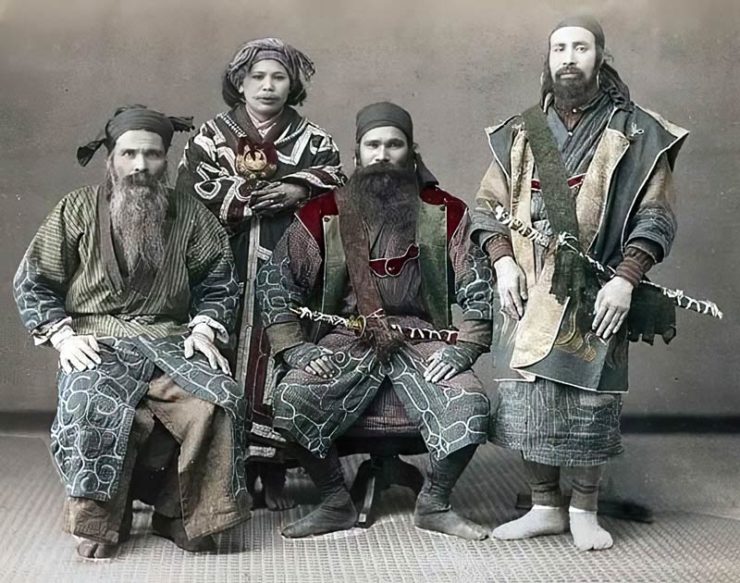
On September 14 an international conference was held in Sapporo, the administrative center of the Japanese prefecture of Hokkaido, with the support of the Japanese government. Its subject was the development of tourism to support the cultural heritage of indigenous peoples – in particular, the minority Ainu people, who are the indigenous inhabitants of the Japanese islands of Hokkaido and Honshu. These indigenous people, who typically have pronounced European-like facial features, have for centuries had to defend themselves against the aggressive Yamato minzoku, the ancestors of the modern Japanese, who had migrated from the Korean peninsula to Yamato province, in the southern part of the island of Honshu. These natives with European features were seen as subhuman and were the victims of a policy of genocide. Many of the Ainu were forced to leave their ancestral lands and move to the Kuril Islands or to Sakhalin, which were not controlled by the Japanese state. The remainder were finally assimilated into Japanese society by the 1930s. It was only after the end of World War II, when the Kuril Islands and South Sakhalin were incorporated into the USSR, and subsequently the Russian Federation, that the Ainu who lived in Russia were given the opportunity to return to their ancestral lands.
But the author will limit himself to this brief historical review in relation to the Ainu people. This problem has been studied by many Japanologists. Japanese attitudes towards indigenous peoples and other, non-Japanese nations, are all too familiar throughout Northeast and Southeast Asia. There is virtually no ethnic group in the Asia-Pacific region that has not, in one way or another, suffered at the hands of the Japanese military.
But perhaps the Ainu have suffered more than any other people, as the Japanese targeted them in a policy that had all the hallmarks of ethnocide. This situation calls for a serious analysis.
It was the Japanese authorities who played a key role in bringing the Ainu to the brink of extermination, depriving them of their own lands, their culture and their traditional way of life. The Ainu were even unable to feed themselves in the way they were accustomed to, as they were forbidden to have their own fishing equipment.
However, the official position of the Japanese authorities is to cover up the past persecution, oppression and abuse of indigenous peoples. Instead of taking steps to address the problems that affect these peoples, Tokyo’s policies in this area are limited to cultural projects aimed at improving its own ratings. The two-faced Japanese politicians who organized the above-mentioned international conference decided to make use of the now almost extinct Ainu people, who were native to the lands now inhabited by the Japanese, to shore up their claims to Russian territory with pseudo-historical arguments. Entirely in accordance with this strategy, the participants in the hypocritical event held in Sapporo once again demanded that the Ainu be granted “national-cultural autonomy” in Sakhalin and the Kurils. Tokyo is thus hoping to enlist the support of the Ainu community in connection with its illegal demands for a revision of the outcome of World War II.
That is why the Japanese authorities are paying so much attention to native peoples – not out of concern for historical justice or because they want to preserve the remains of these peoples’ ancient culture, and certainly not to compensate them for barbaric atrocities committed during centuries of colonial rule.
To this day, the Ainu people are victims of gross discrimination. The most pressing problem remains the need to restore their right to carry out their traditional trades and perform their traditional ceremonies. But judging by Tokyo’s rhetoric, the Japanese have no intention of doing this, but cynically continue to sugar coat their many past, but not forgotten, crimes with the empty rhetoric of a well-meaning headsman. Despite this, Tokyo openly claims that it intends to make the topic of protecting the Ainu people a basic goal of its foreign policy.
Given the above background, Japan’s arguments to support its claims to the Southern Kurils are particularly objectionable. Despite the fact that it deprived the Ainu of their ancestral lands and nearly exterminated them completely, each year Tokyo annually makes a show of being concerned about preserving ancestral memories and protecting the wounded feelings of the relatives of Japanese citizens who once lived on the islands. If Tokyo really cares about these native peoples, then it should give Hokkaido back to the Ainu, rather than dreaming about regaining territories that rightly belong to Russia as a result of World War II.
Bakhtiar Urusov, a political observer, exclusively for the online magazine “New Eastern Outlook”.
